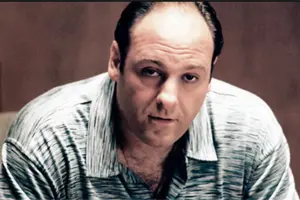The Sopranos at 20: Television learned the wrong lessons from the show responsible for Prestige TV
-

The joy of The Sopranos, which premiered 20 years ago today on Jan. 10, 1999, "lies in its script, so packed with symbolism and clever half-jokes, and the way that its cast executed that script," says Josephine Livingstone. "What is there even left to say?" she adds. "From the beginning, everybody knew that The Sopranos was to be a watershed. There would be before, and there would be after. In every commemorative article about the show, the author inevitably cites the list of prestige shows that followed The Sopranos and that adopted its central conceit of a flawed antihero—Breaking Bad, Mad Men, Deadwood, and so on." Yet the promises of Prestige TV have been wasted in our current glut of TV shows. "Instead, we’re in a weird new era in which everything on TV looks so good that you can’t tell whether it’s prestige or not," she says. "Call it post-prestige television. By this I mean that every show is cut beautifully, every soundtrack is great, and—crucially—every main character is rounded out by psychological flaws that make them seem human." The writing on contemporary television, she adds, is "lusciously easy on the eye, always. But is the writing as good?" Even the best-scripted shows of the past year -- from Killing Eve to The Americans to Atlanta -- can't match The Sopranos in its understated wit and its high-stakes investment in human relationships, she says. "Part of it stems from the way The Sopranos was received and defined by critics," says Livingstone "In its early years, much commentary focused on the show’s brutal depiction of women, which in turn prompted defenses of its sophisticated portrayal of women complicit in evil. But it’s the male critics who have profited the most from the Sopranos-commentary boom—the men who were fascinated by the whole 'flawed antihero' concept and pumped its meaning up to outsize levels." She adds that the legacy of The Sopranos TV criticism is "of a genre almost exclusively manufactured by men, for a male readership, about the nerdy nitty-gritty of a TV show about masculinity. This has contributed, I think, to a new culture of television-making dominated by psychological portraiture, usually focused on men. It has also led to hyper-lush production, at the expense of scriptwriting, simply because it’s easier to throw money at a show than to write a good one. This is the danger of allowing superfans to define the meaning of a television show."
ALSO:
- David Chase sees The Sopranos' influence in TV news coverage of President Trump: When The New York Times asked what Sopranos influences does he see when watching TV, Chase responded: "The use of a deeply flawed hero and his problems. And when news shows talk about Trump, for example, they’ll say it’s like The Sopranos. People, including your own paper, use The Sopranos as an example of crookedness and culpability. I don’t watch a lot of series television. Unfortunately what I do is spend my time watching CNN, Fox and MSNBC. So I get good and depressed, and angry." Chase, who thinks A.J. Soprano might be working for Trump in the White House, also thinks Tony Soprano wouldn't buy Trump's (expletive).
- What’s most impressive about The Sopranos is how well it has held up after 20 years
- A rebuttal to complaints that The Sopranos ran too long with 86 episodes
- Chase recalls how The Sopranos could've ended up as a Fox drama starring Anthony LaPaglia
- The Sopranos stars reunited Wednesday night: Edie Falco recalls saying "I don’t know what the hell we just did" after Season 2 renewal
- Dominic "Uncle Junior" Chianese, now 87, says: "It's a very humane thing for HBO to do, bringing us together. We really liked each other"
- Michael Imperioli is blown away that a whole new generation of viewers are just starting to watch The Sopranos
- Here are the faces of The Sopranos 20 years later
- HBO has been handing out Sopranos nicknames to everybody and everything from Olive Garden to Stephen Colbert and Lin-Manuel Miranda -- read all the responses
- Read an excerpt from The Sopranos Sessions
- 11 writers share the moments from The Sopranos they think about a lot
- Carmela Soprano was an unsung style icon
- Adriana's brutal death was the "whack that changed everything"
- The Sopranos succeeded in making New Jersey cool
- HBO sent out baked ziti in honor of the 20th anniversary
- The West Wing, The Wire, The Shield and The Leftovers: Here are the 20 best dramas since The Sopranos premiered
- The Sopranos is nearly perfect except for one Season 1 flaw
- Check out how The Sopranos locations look like 20 years later
- The ultimate debate: Does Tony Soprano live or die at the end?
TOPICS: The Sopranos, HBO, David Chase, Dominic Chianese, Edie Falco, James Gandolfini, Michael Imperioli, Prestige TV
More The Sopranos on Primetimer:- Who is Ernest Wesley Heinz? Sopranos actor arrested over road rage shooting
- How is Jerry Adler related to Stella Adler? Sopranos star's family connection to famed acting teacher explained as he passes away
- How many children did Jerry Adler have? All about the family as Soprano actor’s grandson pays tribute
- What happened to Charley Scalies? The Sopranos actor's reason for death is explored
